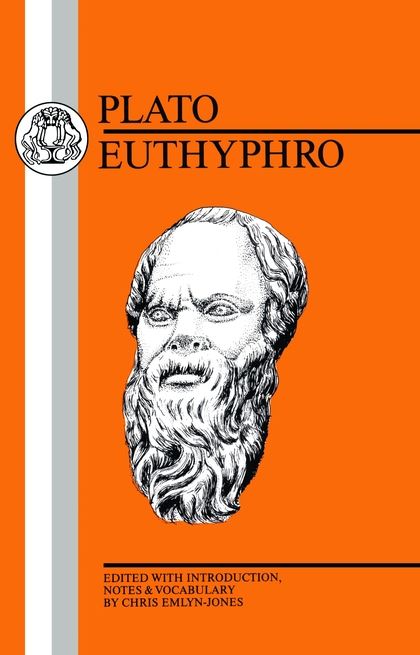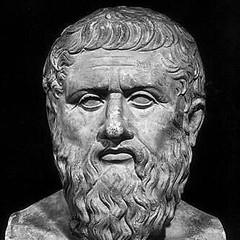Plato Euthyphro
10 min read ⌚
 Do you know what the Euthyphro dilemma is?
Do you know what the Euthyphro dilemma is?
In case you don’t, it’s time to find out – because it’s certainly one for the ages!
There are two ways you can do that.
You can either read the entirety of Plato’s dialogue Euthyphro here, or you can read a concise summary of all of its main paints below.
If you’ve opted for the second one – let’s go!
Who Should Read “Euthyphro”? And Why?
Euthyphro is an early and rather brief dialogue between Socrates and the title character, and, as such, it is a great way to get to know both Plato and Socrates.
And, really, that should be a necessity – not only if you are a philosophy student.
About Plato
Plato is, for all intents and purposes, the earliest and one of the greatest philosophers in all of human history; he is widely considered the father of modern philosophy.
is, for all intents and purposes, the earliest and one of the greatest philosophers in all of human history; he is widely considered the father of modern philosophy.
A student of Socrates (who left no written works behind him) and a teacher of Aristotle (who wrote many books to question Plato’s reasoning), Plato basically laid the foundations of everything we consider philosophy today, authoring such diverse classics as The Apology and The Republic and giving us stories of almost mythic proportions such as the famous “Allegory of the Cave.”
As it is only fittingly, Plato also founded the Academy of Athens, the first institution of higher learning in the Western world.
Book Summary
Euthyphro is one of Plato’s earliest Socratic dialogues. It recounts the conversation between the eponymous character and Socrates a few weeks before the famous trial of the latter.
The dialogue concerns the meaning of piety, or that virtue usually regarded as a manner of living that fulfills one’s duty both to gods and to humanity.
The main topic of discussion: is the definition of piety.
The answers given: okay, but probably a bit anachronistic.
The questions posed: were extraordinary, vital, illuminating.
And still unanswered.
A good reason as any to bear with us for ten minutes or so, right?
The Setting and the Characters
The year is 399 BC.
The place: Athens.
Near the archon basileus – which is Greek for king magistrate, i.e., the man charged with presiding trials over homicide and over religious impiety – Socrates happens upon a guy named Euthyphro.
From the words exchanged between them (think of Euthyphro as a sort of boring Beckettian play with only two characters), we soon learn that both men are waiting for the preliminary hearings for possible trials.
In the case of Euthyphro, it is a murder trial: he wants to press charges against his father for killing a worker of his by reason of severe negligence. Namely, after arresting him (the worker had previously killed a slave) he “bound him hand and foot and threw him into a ditch, and then sent to Athens to ask of a diviner what he should do with him.” Unfortunately, “such was the effect of cold and hunger and chains upon him, that before the messenger returned from the diviner, the worker had died.”
In the case of Socrates, we’re dealing with an entirely different matter. First of all, unlike Euthyphro, Socrates is not the accuser, but the accused. And he is accused of supposed religious transgressions. More specifically, for “failing to acknowledge the gods that the city acknowledges.”
Euthyphro’s Piety
Now, according to Athenian law, only the relatives of the dead man were allowed to file suit for murder. And accusing your own father of doing such a deed was, well, frowned upon.
In other words, Euthyphro is so self-assured in the accuracy of his value system that he is willing to go against everybody and everything to prove it:
And my father and family are angry with me for taking the part of the murderer and prosecuting my father. They say that he did not kill him, and that if he did, dead man was but a murderer, and I ought not to take any notice, for that a son is impious who prosecutes a father. Which shows, Socrates, how little they know what the gods think about piety and impiety.
Now, wait a minute, Euthyphro!
You’re saying that, unlike other people, you do know what the gods think about piety and impiety?
And you say this in front of a man who is about to go on trial for precisely that – impiety?
And that man is none other than Socrates?
Well, dear Euthyphro, you’re in for a lengthy discussion that’s almost guaranteed to make its way to the annals of history!
Socrates’ Impiety
“Good heavens, Euthyphro!” – exclaims Socrates upon hearing Euthyphro saying the words quoted above. “And is your knowledge of religion and of things pious and impious so very exact, that, supposing the circumstances to be as you state them, you are not afraid lest you too may be doing an impious thing in bringing an action against your father?”
Of course not, replies Euthyphro.
After all, he says, Zeus, “the best and most righteous of the gods” according to just about everybody, bound his father Cronus for devouring his sons; and Cronus was even less kind to his father Uranus, castrating him for having hidden his brothers and sisters in the depths of Tartarus.
If the gods think this is just, then how can it not be for humans?
Interestingly enough, Socrates replies by posing Euthyphro a question that may explain why he is in front of the king magistrate in the first place:
And do you really believe that the gods, fought with one another, and had dire quarrels, battles, and the like, as the poets say, and as you may see represented in the works of great artists? The temples are full of them; and notably the robe of Athene, which is carried up to the Acropolis at the great Panathenaea, is embroidered with them. Are all these tales of the gods true, Euthyphro?
There is no doubt in Euthyphro’s mind that they are. His confidence leaves Socrates scratching his bald head. So, he asks Euthyphro to be his teacher. If he could learn the difference between piety and impiety better, he would be able to better defend himself during his trial.
So, he asks Euthyphro pretty straightforwardly: “And what is piety, and what is impiety?”
Euthyphro’s five definitions – each one flawed, as pointed out by Socrates – follow.

The First Definition of Piety
Full of himself, Euthyphro answers Socrates’ question without even blinking an eye:
“Piety is doing as I am doing; that is to say, prosecuting anyone who is guilty of murder, sacrilege, or of any similar crime – whether he be your father or mother, or whoever he may be – that makes no difference; and not to prosecute them is impiety.”
Socrates, apparently, has an objection to this: that is just an example of piety, he says, not a general theoretical definition of the concept. There are also many other pious and numerous different impious acts.
So, in other words, this first Euthyphro’s definition simply won’t do.
The Second Definition of Piety
No problem, says Euthyphro.
I will merely generalize: “Piety, then, is that which is dear to the gods, and impiety is that which is not dear to them.”
That’s better, replies Socrates, but we just talked about them quarreling and fighting with each other. Now, if you think that these stories are true, then you must also think that they have internal misunderstandings over what is pleasing and what is not.
In other words, what is dear to one god, may be hated by another and vice versa.
The Third Definition of Piety
OK, let’s try this then, says Euthyphro: “what all the gods love is pious and holy, and the opposite which they all hate, is impious.”
Now, this is the most interesting definition; and, unsurprisingly, Socrates’ analysis of this question has intrigued philosophers for millennia.
OK, I agree with you, Socrates says. And then he poses the million-dollar question: do all the gods love something because it is pious, or is it pious because the gods love it?
According to Euthyphro’s formulation, it should be the second.
However, there is a problem with this.
Namely, in that case, what is pious is not given once and for all – but changeable. In other words, it doesn’t have an inherent quality, but it gets that quality from someone outside of the thing itself.
But does this mean that, just like a person cannot be beloved in herself/himself, but becomes beloved when someone loves her/him, a thing is pious merely because the gods are pleased with it, and not because it has this quality inherently?
Wouldn’t this mean that piety is, essentially, non-existent?
Now, Socrates doesn’t go this far: he merely wants to point out the “chicken and egg” circularity of this definition.
And if a definition is circular, as all philosophers know, then it is certainly not a good definition.
The Fourth Definition of Piety
At this point, Euthyphro is so confused by Socrates that he is basically forced to agree that his line of reasoning has hit a proverbial wall, and, so, should be immediately redirected. In fact, the fourth definition is not exactly one given by Euthyphro, but one suggested by Socrates.
And it is one which makes some sense: piety is nothing more but a species of the genus justice; i.e., piety is that part of justice focused on caring for the gods.
After Euthyphro agrees with this definition, Socrates objects to himself.
But what’s the point of humans caring for the gods? We care for animals because we love them and, because, they may die if we don’t; and, conversely, improve through our care.
The gods, being gods, cannot.
So, what is the point of our care? How is that justice? And how is it all connected to piety?
The Fifth Definition of Piety
At this point, Euthyphro is at his wit’s end.
So, when he tries to explain to Socrates that “to learn all these things accurately is very tiresome” he is, in fact, saying: “Oh, leave me alone, Socrates! I have made up my mind, and I don’t have to explain it to everybody…”
Even so, he tries yet again: “piety or holiness is learning how to please the gods in word and deed by prayers and sacrifices.”
And this is how the dialogue ends:
– OK. But, once again, what benefits would the gods have from these prayers and sacrifices? If they do have some – isn’t it a bit unholy to define piety in terms of exchange and commerce between humans and gods? If they don’t – then why do we pray and sacrifice things to them?
– They receive nothing from our prayers and sacrifices, replies Euthyphro, but sheer pleasure.
– Aha, says Socrates, so then piety is what is pleasing to the gods.
– Yup – smirks Euthyphro.
– God, Euthyphro, be more attentive: we already went through that definition – it is the second one. You must have something better than that.
– You know what, Socrates, I do have, but I’ll leave it for another time, for I am in a hurry, and must go now.
We modified some of the words there, but we assure you that the last part of that last sentence is all Plato.
Key Lessons from “Euthyphro”
1. The Power of Socratic Irony
2. The Original Euthyphro Dilemma
3. The Euthyphro Dilemma: Modifications and Consequences
The Power of Socratic Irony
Just like many other books written by Plato, Euthyphro is an excellent example of Socrates’ use of irony to make his point.
As explained in a Guardian article, the technique boils down to this: “to pretend ignorance and, more sneakily, to feign credence in your opponent’s power of thought, in order to tie him in knots.”
Now you understand better what “I know that I know nothing” actually means.
Just like Nassim Nicholas Taleb, Socrates knew far more than nothing – precisely by understanding that he knew nothing.
The Original Euthyphro Dilemma
This is how the original Euthyphro dilemma sounds:
The point which I should first wish to understand is whether the pious or holy is beloved by the gods because it is holy, or holy because it is beloved of the gods.
As you can see, it is an example of “the chicken or the egg” causality dilemma.
And “piety” is only one of the things it can be applied to.
The Euthyphro Dilemma: Modifications and Consequences
OK, you think, I get that the Euthyphro dilemma leads basically to nowhere when it comes to piety. But I don’t see how that affects my life?
Well, here’s how: is a work of art beautiful because of its beauty, or is it beautiful because people say it is? Even better: are these works of art in museums on account of being works of art, or are they called works of art because they are there?
Is The Shawshank Redemption great because it is beloved by so many people, or do people notice something in the movie that is great in itself?
If the latter (claimed by essentialists) why do some people have problems seeing it? If the first (defended by conventionalists) then are all things (whether beautiful, good, or funny) merely a thing of convention?
Is it possible that we war with each other simply because we’ve chosen to adhere to different conventions?
Like this summary? We’d like to invite you to download our free 12 min app for more amazing summaries and audiobooks.
“Euthyphro Quotes”
Now, as the asker of a question is necessarily dependent on the answerer, whither he leads-I must follow; and can only ask again, what is the pious, and what is piety? Click To Tweet I really do not know, Socrates, how to express what I mean. For somehow or other our arguments, on whatever ground we rest them, seem to turn round and walk away from us. Click To Tweet I prefer nothing, unless it is true. Click To Tweet The point which I should first wish to understand is whether the pious or holy is beloved by the gods because it is holy, or holy because it is beloved of the gods. Click To Tweet Does not every man love that which he deems noble and just and good, and hate the opposite of them? People regard the same things, some as just and others as unjust – about these they dispute; and so there arise wars and fightings among… Click To TweetOur Critical Review
In its bare essence, Euthyphro is a discussion about the meaning of abstract and fundamental concepts such as piety and justice.
A lot of things have happened since Plato put Socrates’ thoughts about these on paper – pardon us, papyrus – so, some of the definitions you can find in this dialogue sound a bit outdated – or even basic.
However, it is Plato and Socrates we’re talking about here, so, whether you’ll like it or not, Euthyphro will make you smarter.
And it will do that in one of these two ways.
First of all, just like all other Socratic dialogues by Plato, it will teach you how you can think about things. And that is more than simply teaching you about things. In fact, according to Kant, that’s what a philosopher’s primary objective should be.
And secondly, it will provide you with an inexhaustible stock of food for your thoughts for as long as you live: the Euthyphro dilemma.
It is one of those mental experiments which don’t have a correct solution, but which can help you learn a lot about yourself.
So – are you an essentialist or a conventionalist?
Emir is the Head of Marketing at 12min. In his spare time, he loves to meditate and play soccer.







